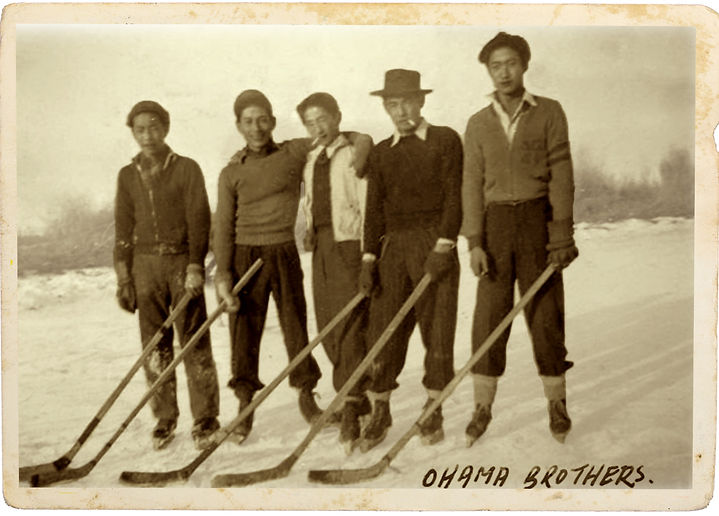THE OHAMA BROTHERS

George, Kingo, Albert, Charlie, Sonny and Tona (unpictured photographer) playing Canada’s game on a frozen pond near Rainier, Alberta, in 1945.
It was just after Christmas and brother Tona (my Grandfather) had taken a trip to Calgary to buy everyone a pair of ice skates.
When Canada entered the war in the Pacific on January 7, 1941, a decision was made to move all Canadians of Japanese decent into camps all across Canada.
The Ohamas would spend time in these camps located in Alberta, Manitoba and Ontario before settling on the prairies of Southern Alberta to farm.
The first years were extremely tough as Tona and his brothers couldn't sell any of their produce due to prejudices against Japanese-Canadians at that time.
This wouldn't deter the Ohamas though - they would persevere and become one of the most successful potato farms in all of Canada. My Grandfather, Tona, would go on to win in both the seed and table international grand champion categories at the Toronto Royal Fair 1965 and became the first Albertan to win.
The Ohamas are an inspiring Japanese-Canadian story. A family who no matter what obstacles they faced (racism, relocation, hostile land) found a way to become successful.
Despite how their birth country treated them, they still held true to their values and traditions. Even adopting the most Canadian tradition of all - Hockey.
On that frozen pond in 1945, the Ohamas gathered together to enjoy a sport all Canadians enjoy. And it reminds us of what brings all of us together every winter - no matter who we are.

A film by family film maker Linda Ohama on the history of the potato farm.
A haunting portrait of displacement symbolized by the final harvest of a family's potato farm before facing their imminent foreclosure.
Their saga began with the Canadian government’s removal of all Canadians of Japanese decent during World War II. The Ohama family ended up as farm laborers on the Great Plains desert of southern Alberta. They eventually bought the farm, grew internationally prized potatoes and became an important part of their community until1992, when they became one more farm added to the thousands of family farms lost to the banks.
This story is a beautiful testimony to the strength of the human spirit and love for the family and the land.
